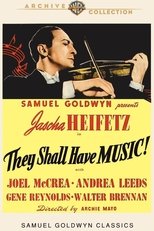Jascha Heifetz

Jascha Heifetz
From Wikipedia Jascha Heifetz (/ˈhaɪfɪts/; February 2 [O.S. January 20] 1901 – December 10, 1987) was a Lithuanian-born American violinist. He was born in Vilnius. As a teen, he moved with his family to the United States, where his Carnegie Hall debut was rapturously received. He had a long and successful performing and recording career; after an injury to his right (bowing) arm, he focused on teaching. The New York Times called him "perhaps the greatest violinist of all time." Heifetz played a featured role in the movie They Shall Have Music (1939) directed by Archie Mayo and written by John Howard Lawson and Irmgard von Cube. He played himself, stepping in to save a music school for poor children from foreclosure. He later appeared in the 1947 film, Carnegie Hall, performing an abridged version of the first movement of Tchaikovsky's Violin Concerto, with the orchestra led by Fritz Reiner, and consoling the star of the picture, who had watched his performance. Heifetz later recorded the complete Tchaikovsky concerto with Reiner and the Chicago Symphony Orchestra as one of RCA Victor's "Living Stereo" discs. In 1951, he appeared in the film Of Men and Music. In 1962, he appeared in a televised series of his master classes, and, in 1971, Heifetz on Television aired, an hour-long color special that featured the violinist performing a series of short works, the Scottish Fantasy by Max Bruch, and the Chaconne from the Partita No. 2 by J.S. Bach.







